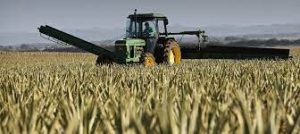 Agriculture accounts for 2.8% of the total district economy and contributes R690 million per annum.
Agriculture accounts for 2.8% of the total district economy and contributes R690 million per annum.
Potatoes are by far the most produced and important crop in the CDM. The production value of potation totalled R200 million in 2000. This is followed by tomatoes (R98 million), eggs (R88 million) and broilers and beef almost equal at R61 million. Pork and citrus production are also substantial at R37 million respectively.
Polokwane’s farmers produce 60 000 tons of onions, generating R50 million per, but import all of their agricultural inputs comprising 65% of production value (Steyn: Agricultural Cluster Study).
The CDM is home to one of the largest citrus estates in the country, namely, Zebediela Citrus Estate (13 785 ha) which is located in the Lepelle-Nkumpi Municipality in Zebediela. This estate produces citrus mainly for the international market. The Zebediela Citrus Plantation exports most of its produce and supplies the rest to local markets.
CDM has thriving livestock farming. The majority of livestock are goats (44%) followed by cattle (38%), pigs (10% and sheep (9%). The district had 240 000 goats, 200 000 cattle, 55 000 pigs and 50 000 sheep in 2001. The proportion of cattle in the district increased between 1995 and 2001 while the proportion of goats lessened. Commercial livestock farming constitutes 25% of livestock farming in the district, whilst communal represents 75%.
The Limpopo Department of Agriculture is a key partner of the district’s agriculture development programme. More than 100 different agriculture development projects are being supported across the district. These are focused on poultry, vegetables, lucerne production, livestock, diary farming and agro-processing. The district has budgeted for the establishment of a chicken abattoir, broiler chicken farming and processing (R1 million), fishing farm (R1.3 million), secondary vegetable cooperatives (R80 million), Paprika Beneficiation (R3.2 million) and hydroponics (R177 million) amongst other major agricultural developments.
The following strength and weaknesses were identified with regards to agriculture development in the district (Summit, 2007):
|
|
|
|
|
|
 CDM Municipality
CDM Municipality

